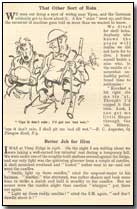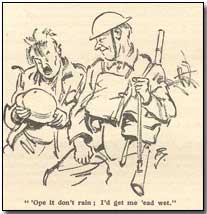Memoirs & Diaries - The Best 500 Cockney War Stories - That Other Sort of Rain and Other Stories
 Published in London
in 1921, The Best 500 Cockney War Stories
comprised, in the words of its newspaper publisher (The London Evening
News) "a remembering and retelling of those war days when laughter
sometimes saved men's reason".
Published in London
in 1921, The Best 500 Cockney War Stories
comprised, in the words of its newspaper publisher (The London Evening
News) "a remembering and retelling of those war days when laughter
sometimes saved men's reason".
The collection of short memoirs, some 500 in total, is divided into five categories - Action, Lull, Hospital, High Seas and Here and There. This page contains five stories from Action, led by That Other Sort of Rain.
Other sections within the collection can be accessed using the sidebar to the right.
That Other Sort of Rain
We were out doing a spot of wiring near Ypres, and the Germans evidently got to know about it. A few "stars" went up, and then the rat-tat-tat of machine guns told us more than we wanted to know.
We dived for shell holes. Anybody who knows the place will realise we did not have far to dive.
I found myself beside a man who, in the middle of a somewhat unhealthy period, found time to soliloquise:
"Knocked a bit right aht me tin 'at. Thought I'd copped it that time. Look, I can get me little finger through the 'ole. Blimey, 'ope it don't rain, I shall git me 'ead all wet."
H.C. Augustus, 67 Paragon Road, E.9
Better Job for Him
I was at Vimy Ridge in 1916. On the night I am writing about we were taking a well-earned few minutes' rest during a temporary lull. We were under one of the roughly-built shelters erected against the Ridge, and our only light was the quivering glimmer from a couple of candles. A shell screeched overhead and "busted" rather near to us - and out went the candles.
"Smith, light up those candles," cried the sergeant-major to his batman. "Smithy," who stuttered, was rather shaken and took some time to strike a match and hold it steadily to the candles. But no sooner were the candles alight than another "whopper" put them out again.
"Light up those ruddy candles!" cried the S.M. again, "and don't dawdle about it!"
"Smithy," muttering terrible things to himself, was fumbling for the matches when the order came that a bombing party was required to clear "Jerry" out of a deep shell-hole.
"'Ere!" said "Smithy" in his rich Cockney voice. "J-just m-my m-mark. I'd r-rather f-frow ' eggs' t-than light c-c-candles!"
W.C. Roberts, 5 Crampton Street, S.E.17
Sentry's Sudden Relief
I was the next turn on guard at a battery position in Armentieres one evening in the summer of 1917. A Cockney chum, whom I was going to relieve, was patrolling the position when suddenly over came a 5.9, which blew him about four yards away.
As he scrambled to his feet our sergeant of the guard came along, and my chum's first words were, "Sorry, sergeant, for deserting me post."
T.F. Smithers (late R.F.A.), 14 Hilda Road, Brixton, S.W.9
The World Kept Turnin'
The Poperinghe-Ypres road. A large shell had just pitched. Among the wounded was a Cockney who was noted for his rendering on every possible occasion of that well-known song, "Let the Great Big World Keep Turning."
He was lying on the roadway severely hurt. Another Cockney went up to him and said "'Ello, matey, 'urt? Why ain't yer singin' 'Let the Great Big World Keep Turnin',' eh?"
The reply came: "I was a singin' on it, Bill, but I never thought it would fly up and 'it me."
Albert M. Morsley (late 85th Siege Battery Am. Col.), 198 Kempton Road, East Ham, E.6
That Blinkin' "Money-box"
I was limping back with a wounded knee after the taking of Monchyle-Preux on April 11, 1917, when a perky little Cockney of the 13th Royal Fusiliers who had a bandaged head caught me up with a cheery, "Tike me Chalk Farm (arm), old dear, and we'll soon be 'ome."
I was glad to accept his kindly offer, but our journey, to say the least, was a hazardous one, for the German guns, firing with open sights from the ridge in front of the Bois du Sart, were putting diagonal barrages across the road (down which, incidentally, the Dragoon Guards were coming magnificently out of action, with saddles emptying here and there as they swept through that deadly zone on that bleak afternoon).
Presently we took refuge in a sandbag shelter on the side of the road, and were just congratulating ourselves on the snugness of our retreat, when a tank stopped outside. Its arrival brought fresh gunfire onus, and before long a whizz-bang made a direct hit on our shelter.
When we recovered from the shock, we found part of our roof missing, and my little pal, poking his bandaged head through the hole, thus addressed one of the crew of the tank who was just visible through a gun slit.
"Oi, why don't yer tike yer money-box 'ome? This ain't a pull-up fer carmen!"
The spirit that little Cockney imbued into me that day indirectly saved me the loss of a limb, for without him I do not think I would have reached the advance dressing station in time.
D. Stuart (late Sergeant, loth R.F., 37th Division) 103 St. Asaph Road, Brockley, S.E.4
Next - "Oo, You Naughty Boy" and four other stories
The German word "U-Boat" was derived from "Unterseeboot" (undersea boat).
- Did you know?

